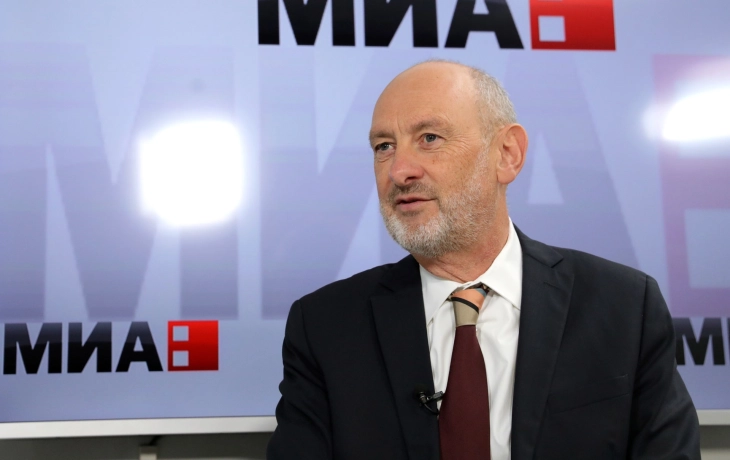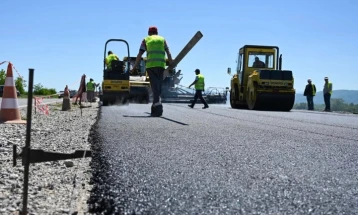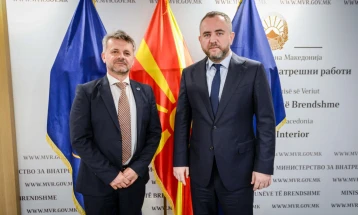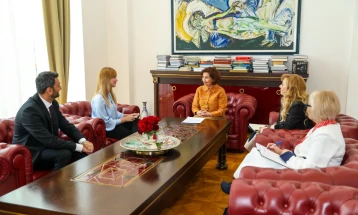Geer for MIA: Decision on North Macedonia reached in July 2022, constitutional amendments necessary for next step
- The EU Ambassador David Geer, in an interview with MIA, drawing parallels between what happened at the EU Summit in December, when the so-called "Orban coffee" facilitated the decision for start of EU accession negotiations for Ukraine and Moldova, and whether such a decision-making approach could have been possible for North Macedonia, said that there is a solution already on the table that was agreed in July 2022 which allowed North Macedonia to open accession negotiations, and in order to move to the next step, it is necessary to make constitutional amendments, and this is a choice for the country, a sovereign decision.

Skopje, 13 January 2024 (MIA) - The EU Ambassador David Geer, in an interview with MIA, drawing parallels between what happened at the EU Summit in December, when the so-called "Orban coffee" facilitated the decision for start of EU accession negotiations for Ukraine and Moldova, and whether such a decision-making approach could have been possible for North Macedonia, said that there is a solution already on the table that was agreed in July 2022 which allowed North Macedonia to open accession negotiations, and in order to move to the next step, it is necessary to make constitutional amendments, and this is a choice for the country, a sovereign decision.
“There is a solution already on the table that was agreed in July 2022 which allowed North Macedonia to open accession negotiations, which it did, launching the screening process and completing it. Now, in order to move to the next step, in line with the agreement from July 2022, it is necessary to make constitutional amendments regarding the citizens who self-identify as Bulgarian. This is a choice for the country, a sovereign decision, but there is no further decision by the EU member-states that is needed here, it is really in your hands,” Geer said.
He said it is important to see the decision to open accession negotiations with Ukraine and Moldova in the extraordinary context of Russia's illegal war against Ukraine, and also the reform steps that were put in place by both countries although there is still a long way to go.
“I think there has been quite a lot of misinterpretation by some commentators about the way in which the decision was taken. To be clear, the decision was taken by 27, in other words in unanimity with all member-states, and it did not change the fundamentals. The fact that one country was not in the room was not some kind of a smart workaround which removes the unanimity required. It doesn’t provide a solution to a situation where there are one or more member-states with a fundamental disagreement. Unanimity remains and that in this case was the decision of the 27,” Geer said in an interview with MIA.
In regard to the possibility of changing the Negotiating Framework, now following the example of a new decision-making model associated with the "Orban coffee” model, Geer decisively stated that the EU is not looking at reopening the Negotiating Framework.
“First of all, the first implicit question is could there be a better deal. I followed the discussions that took place between the autumn of 2020 and then the agreement in July 2022. It was very difficult, very intensive. Compromises were made on both sides. Neither side — neither the Bulgarian nor the Macedonian — was 100 percent happy. But that's in the nature of compromises. What it did though was it allowed North Macedonia and Bulgaria to put behind these issues and look forward and move forward decisively. Do I think a better deal could be negotiated? Sincerely, I don't see that happening. Is the EU ready to reopen the Negotiating Framework? I think that the EU is not looking at reopening the Negotiating Framework. It is an agreement that has been reached and now we are looking forward and looking at many other issues which are piling on the agenda. Including, we hope very much, this country moving forward decisively on its European path,” Geer said.
Given that constitutional changes have taken a back seat to the upcoming double elections in the country, and the leader of the opposition VMRO-DPMNE, Hristijan Mickoski, maintains a consistent stance of not accepting them under Bulgarian dictate but rather finding an alternative once in power, Geer sends a message that if the party is towards the EU and accession negotiations, what needs to be done is clear.
“Well, if the party is towards the EU and accession negotiations, what needs to be done is clear. There was an agreement from July 2022. We have opened accession negotiations. The screening process has been successful. Now constitutional changes need to be made and then the country can move forward to tackle these key issues we were talking about at the beginning — issues such as the rule of law, the fight against corruption — really focusing on things that will change people's lives,” Geer said.
We talked with the EU Ambassador about the recent events in M-NAV, the fight against corruption, the EU peer review mission on the Judicial Council, the upcoming elections in our country and those in the EU, and the Growth Plan for the Western Balkans.
Below is the full interview with EU Ambassador David Geer, including video footage:

You already came out with a position on the latest developments in national air navigation service provider M-NAV. You urged state authorities to investigate allegations of cronysm in appointments in this service and that you also expect authorities to investigate reports of inappropriate external influence and violence against staff working in M-NAV. You also had a meeting with the president of the union Tasevski last week, and you expressed concern and indicated that you are following the situation. Do you have any knowledge of how Eurocontrol reacts to what is happening in M-NAV?
I am not following what Eurocontrol is doing, but let’s back up a bit. We’ve obviously following very closely the developments in this specific case, as it has been a huge public concern. My colleagues met with the union, I myself didn’t personally. The position that we have expressed is very consistent with the position that we’ve taken regarding public appointments more generally, that it’s imperative that appointments in public institutions are made on the basis of merit, which means in terms of qualification, experience and skills, not on the basis of political affiliation or personal ties. We have also said in this specific case that there are obligations on the part of the state to follow EU law, in particular related to the management of navigation services. In particular, the state needs to ensure a sufficient degree of independence of the body managing the navigation services, and also needs to ensure that appointments to key posts within the service itself should be in accordance with the legal qualifications and also the human resources should be managed in such a way that they respect, first of all safety, efficiency and cost-effectiveness of the institution as a whole. Indeed, we called for these allegations related to inappropriate external influence or entering the premises to be investigated and for the state authorities to take action depending on the outcome of these investigations.
What if this kind of incident took place in a control tower in an EU member-state, what would be the consequences?
At the moment we are talking about the allegations made and this matter is being investigated and should be followed up on. Our concern, which is shared by everybody, is that safety is paramount, this is part of the critical infrastructure where we expect higher standards to be operating there.

We welcomed 2024 with pressure coming from both inside and outside on countering high-level corruption, the enlarged US blacklist and the EC report that highlighted the swift amendments to the Criminal Code that led to expiry of the statute of limitations in a large number of cases of the former Special Prosecutor’s Office. As you see it, where did the system fail?
I think it’s a good thing that there is such a strong emphasis in public discussion about corruption, Some people talk about endemic corruption, some talk about an epidemic, some describe it as a cancer, but we are all talking about the same thing: that there is a level of corruption in public life, a prevalence of corruption which is extremely concerning. It undermines the economic potential of the country, it undermines innovation, it’s one of those factors that drives people to leave the country, and of course it’s a source of inequality and injustice. And therefore, it is very concerning that the report produced by the European Commission last November said there has been no progress in the fight against corruption. We would expect this to be one of the top areas where the authorities should be active in fighting corruption. In particular, it did draw attention, our concerns related to the changes in the Criminal Code. Our concern at the time was that this would lead to more impunity, and there was the misuse of the European flag, but our main concern was that this would perhaps increase the chance of impunity. What we’ve seen in case after case, which is following up on this, is increased impunity, and indeed we now see there is a gap in the law in one specific area which absolutely needs to be plugged as a matter of priority. Now, the Report says some positive things, it talks about the good work carried out by the Commission for Prevention of Corruption to date, as well as the State Audit Office. Now there were elections, and new membership of the State Commission, and we expect those members to perform to the same high standard as the previous and continue with the same determination and integrity. Of course, it can’t just be for the State Commission or the State Audit Office, it needs to be an effort which brings everyone together, led by the authorities, including the Parliament. Media have a key role to play, I laud the efforts made by the investigative journalists we’ve seen in the past years, whistleblowers too. It is very important that investigative journalists get on with their job and shine a light on examples of corruption. We will do what we can to support efforts to combat corruption but this needs to be across-society approach. One area of corruption which we are concerned about is the way in which, over many years, not limited to one party, there has been a practice of key positions being given on the basis of party affiliation, and that is a major concern. I very much hope that the parties going into the elections this year will declare that they are committed to ending this practice of influencing appointments. It has a name, it’s cronyism, nepotism, corruption.

Corruption is a problem for the Western Balkans but no country is immune to this phenomenon and some members face corruption, for example in the misuse of European funds. How does the EU deal with corruption?
You are absolutely right, corruption is part of human activity and therefore all states have to deal with it. The important thing, I think, is to have institutions in place which can respond rapidly to prevent corruption from happening and can pick up the difficulties and problems. It is not so much that corruption happens, it is how you react to it. We've seen the events in the European Parliament, and very importantly the responses from the Parliament to that. So across the board is how you react, putting in place the mechanisms to prevent a reoccurrence of corruption and having a lack of tolerance for corruption at all levels, which also means all of us being intolerant of corruption and to speak up when we see cases of corruption.
The report of the peer review mission on the Judicial Council arrived in December, including 40 recommendations, 17 of which to be applied immediately. How much could these recommendations move things forward, having in mind that the latest EC Progress Report did not note any progress in strengthening of the judiciary’s independence?
Starting with the Judicial Council and why is it important. It is basically the guardian of independence, professionalism and integrity of the judiciary, it has a central role to play. So you can imagine last year in spring and autumn when we saw the Judicial Council taking acts which had no legal base, and this is now being confirmed by the Administrative Court in regards to the dismissal of the then-president of the Judicial Council. We were really concerned because we were seeing the Judicial Council failing on all of these accounts and that’s why we proposed to deploy a peer-review mission that means a group of EU experts and judges who know how a Judicial Council should function. They came up with a series of recommendations- 40. I think that speaks for itself, it's not five or ten it's 40, which I think is an indication of the extent of the problems that the Judicial Council has faced. Now the Administrative Court has effectively taken decision which resulted in the reinstatement of Vesna Damevska as president. This is an opportunity for the Judicial Council to act on the recommendations it is able to act on as a step forward. If we are talking about a post-election scenario it would be for the new government, whatever it is, and the new Parliament to act vigorously to ensure that the remaining recommendations are considered and put in place. This way we can have a Judicial Council which is really doing its job and pushing back against external interference.

Can you give us a framework in which these recommendations should be implemented?
What the Judicial Council needs to do is look at the report and recommendations which they are able to implement for themselves and see what can be done now, bearing in mind that they have the responsibility not to the peer-review or EU, but to ordinary citizens who expect better from the judiciary than what they've seen so far.
In retrospect of 2023, what stirred the public and maybe opened the issue whether things could have been done differently for our country is the so-called “Orban coffee” during the EU Summit in December. Ukraine and Moldova received the recommendation for the start of the EU accession negotiations with 26 “yes” votes, whereas the 27th that threatened a veto went out to get a coffee during the vote, as suggested by German Chancellor Olaf Scholz. Was this possible in the case with North Macedonia, or was it that no one stood firm behind the country as Germany did in this case?
First of all, it is important to see the decision to open accession negotiations with Ukraine and Moldova in the extraordinary context of Russia's illegal war against Ukraine, and also the reform steps that were put in place by both countries although there is still a long way to go. I think there has been quite a lot of misinterpretation by some commentators about the way in which the decision was taken. To be clear, the decision was taken by 27, in other words in unanimity with all member-states, and it did not change the fundamentals. The fact that one country was not in the room was not some kind of a smart workaround which removes the unanimity required. It doesn’t provide a solution to a situation where there are one or more member-states with a fundamental disagreement. Unanimity remains and that in this case was the decision of the 27. But, there is a solution already on the table that was agreed in July 2022 which allowed North Macedonia to open accession negotiations, which it did, launching the screening process and completing it. Now, in order to move to the next step, in line with the agreement from July 2022, it is necessary to make constitutional amendments regarding the citizens who self-identify as Bulgarian. This is a choice for the country, a sovereign decision, but there is no further decision by the EU member-states that is needed here, it is really in your hands.
Although the question over the possibility of changing the Negotiating Framework is regularly asked and the answer is always “no”, could there be any changes in the future EU decision-making process upon this “Orban coffee” model?
First of all, the first implicit question is could there be a better deal. I followed the discussions that took place between the autumn of 2020 and then the agreement in July 2022. It was very difficult, very intensive. Compromises were made on both sides. Neither side — neither the Bulgarian nor the Macedonian — was 100 percent happy. But that's in the nature of compromises. What it did though was it allowed North Macedonia and Bulgaria to put behind these issues and look forward and move forward decisively. Do I think a better deal could be negotiated? Sincerely, I don't see that happening. Is the EU ready to reopen the Negotiating Framework? I think that the EU is not looking at reopening the Negotiating Framework. It is an agreement that has been reached and now we are looking forward and looking at many other issues which are piling on the agenda. Including, we hope very much, this country moving forward decisively on its European path.

The opposition did not support the constitutional changes, a process that opened in the Parliament and is still open due to the lack of the required majority. VMRO-DPMNE leader Hristijan Mickoski has continually said that after coming to power, he would seek for another solution. What other solution could there be for North Macedonia?
Well, if the party is towards the EU and accession negotiations, what needs to be done is clear. There was an agreement from July 2022. We have opened accession negotiations. The screening process has been successful. Now constitutional changes need to be made and then the country can move forward to tackle these key issues we were talking about at the beginning — issues such as the rule of law, the fight against corruption — really focusing on things that will change people's lives.
But in the situation with Ukraine and Moldova, for example, considering the new geopolitical developments you mentioned — the illegal war, Russia's war in Ukraine — the enlargement policy is now, more than ever, a geostrategic investment in long-term peace, security and stability. However, North Macedonia did not start the negotiations and the Western Balkans is not fully integrated. Can the delay have security consequences, taking into account that the decisions on Ukraine and Moldova have a security background?
I fully agree with you that in recent years, in particular since the war against Ukraine, we've seen that enlargement is viewed not just through a question of prosperity, living standards and democratic values — that's incredibly important, all of that — but is also seen through the lens of security and stability. Earlier today, I had an event with the Minister of Defense and we were celebrating the support the EU is providing to the army of this country in terms of equipment, defense cooperation. There are many other areas touching on stability and security where we're working together: border control, the fight against extremism, hybrid threats, disinformation, cyber — all are areas where we're working together – because the benefits of enlargement are also in the security and stability area and this will only increase over time. So we hope very much to intensify our efforts and as the country moves towards the EU so not only does it become more prosperous but also becomes more stable and more secure. I'm confident that we can move in that direction.

How realistic is the 2030 target as the year for EU accession and how can one make predictions at this time, considering that the Union is having elections this year and a change in the top positions?
Many elections this year including in this country. And maybe starting on this country, I mean, we expect and citizens expect for this country to again hold elections in accordance with democratic standards. And we expect them to be taken, and to be carried out, implemented in accordance with democratic standards. And I hope very much that the different contestants and different parties will use the opportunity to put before citizens the choice what their programmes are, what their objectives are, where they want to take the country, so the citizens have a real choice. Concerning the European elections themselves, I am not going to speculate, that’s the work for pundits and pollsters, but it is clear that the end of the last year that the EU made a very clear, strong commitment once again to the accession path of not just Ukraine and Moldova but to Western Balkans and that commitment is based on the idea of reform. That’s the key question, if this country progresses on reform, it will join the European Union. And it’s not a theoretical and abstract thing, we know what needs to be done. We’ve just spent a year during incredibly intensive work on identifying in every different sector exactly what needs to be done. The country has developed roadmaps in certain areas as well. So, the steps that need to be taken are very practical and very clear. You take those steps then you will join the EU. But there’s no way around that.

At the beginning of November, the EC put forward the Growth Plan for the Western Balkans. According to announcements, the first funds of this plan will be transferred at the start of the second quarter of 2024. How realistic is for this to happen in April, considering the procedures within the EU?
The Growth Plan is a big opportunity. Because what it is trying to do is to try to stimulate growth here and the rest of the Balkans because it has been pretty poor and pretty pale let alone growth. We want to see much stronger growth, economic growth and the improvement in living standard that makes a real difference to people and also brings the country much closer to the European Union. And what’s radical and new about this proposal, and some of the ideas came from this country and from the region itself, is to make available some of the benefits of the European Single Market to the country before you join, remembering that the Single Market is the real driver of growth within the European Union itself. Together with very substantial investments from the EU side in a form of grants and loans, up to a possible maximum of EUR 6 billion, still is being discussed with the member states, based on commitment on this side to implement specific reforms so that if you have access to those parts of the market you can compete on a level footing and you also not a drain on the market or you are not undercutting the European standards and also a commitment for integration within the region, removing barriers across the Western Balkans to trade and to economic activity in line with EU standards. And with all of these taken together, we hope to be able to boost the economies of the region and therefore speed up accession to the European Union.
Ana Cvetkovska
Photo: Frosina Naskovikj
Video and editing: Aslan Vishko and Vladimir Rabasovikj







